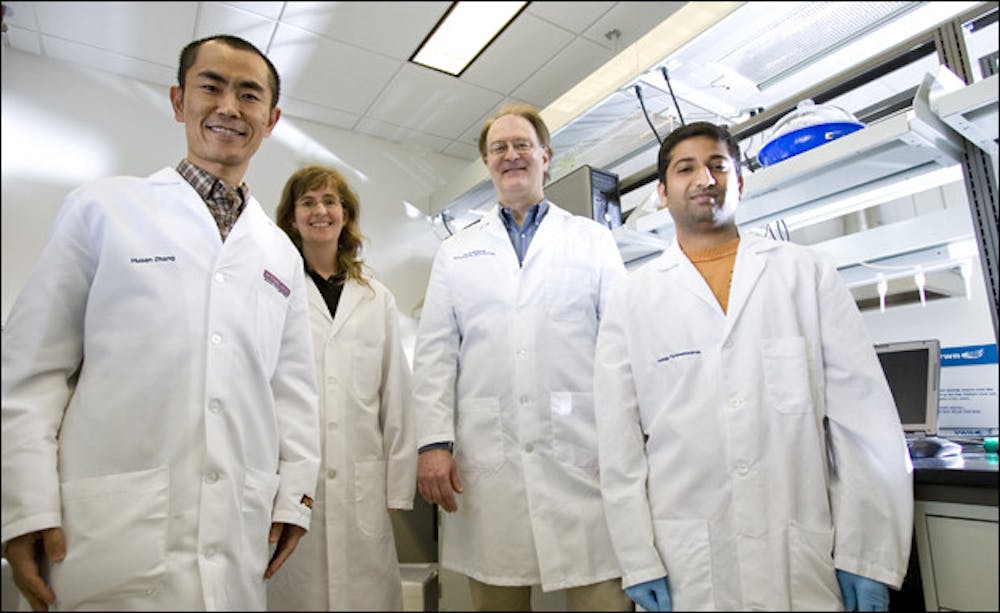Losing weight may become easier in the future based on ASU research about the relationship between obesity and microbes.
Bruce Rittmann, director of the environmental biotechnology lab at the Biodesign Institute, supervises current research on microbes in the gut linked to obesity.
The variety of microorganisms found in people can determine if a person is obese or not, Rittmann said.
Rittmann said that Dr. John DiBaise, from the Mayo Clinic in Scottsdale called him up to ask if he would be willing to do research with microorganisms and their relation to obesity.
Microorganisms “are really important in the human intestines and particularly with respect to obesity,” Rittmann said.
Patients from the Mayo Clinic were asked for permission to use their stool samples for the project, which started on April 2007, Rittmann said.
Three groups, the obese, non-obese and those who have had gastric bypass surgery, were used in the research with nine participants total, Rittmann said.
Researchers then extracted the participants’ DNA from the stool samples at the Mayo Clinic.
“We’re interrogating genetic information out of the microorganisms … so we’re looking at basically who they are based on the sequence of the DNA,” Rittmann said.
The current stage of the research is observing the microorganisms and identifying what they’re doing, Rittmann said.
“We look for organisms that produce acetate, and we found some actually in the obese,” Rittmann said.
Acetate is linked to obesity because it can convert into fat after traveling through the intestine, Rittmann said.
There are also organisms found in only obese people that make hydrogen and consume it, Rittmann said.
However, in obese people, hydrogen gas blocks the path of acetate and is then removed by methanogens.
Methanogens are organisms that create methane. Acetate then has the ability to eventually convert into fat and increase weight, Rittmann said.
Husen Zhang, who works as an assistant research scientist in the lab, said his research involved a surprising conclusion for obesity.
“We would have guessed the opposite for one of [the conclusions],” Zhang said.
“Obese people have a relatively high number of methane-producing organisms, while normal weight people do not have any,” Zhang said.
Zhang said he has several reasons for his interest in the lab and projects at the Biodesign Institute.
Rittmann “is perhaps the foremost researcher in environmental biotechnology Zhang said. These two projects are very exciting, and I think I can contribute significantly.”
The research so far does not reveal the causes and effects of obesity, but rather an association, Rittmann said.
“People who are obese have these organisms that at least reinforce [obesity],” Rittmann said. “We don’t know if it was the cause of them becoming obese, or if it’s just something that occurred that reinforces [obesity].”
In the future, Rittmann said he would like to help those who have a good diet but cannot lose weight easily.
“What we would like to do is do some studies and attempt to manage the microbial community in people,” Rittmann said.
Rittmann said that he believes his research “gives us another tool in the tool belt to help people manage their weight.”
Although Rittmann usually works with microorganisms in the environment, he has done several projects that pertain to the human body, including anti-aging research and the obesity project.
“Now, we’re starting a new environment… We’re the environment, but it’s the same concept,” Rittmann said.
One student who works in the lab is Hyung Sool Lee, a graduate student with a master’s degree in environmental engineering.
Although Lee said he mainly works with bioenergy and the environment instead of obesity, he appreciates Rittmann’s philosophy on microorganisms and environmental biotechnology.
“He always said: Understand microorganisms and help them to be happy, and finally, they help us,” Lee said.
Reach the reporter at reweaver@asu.edu.




